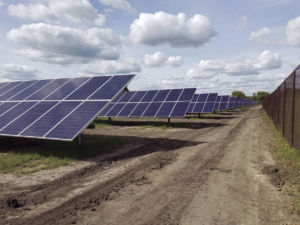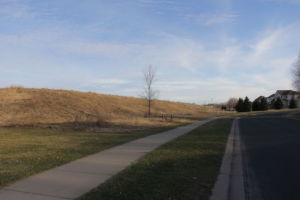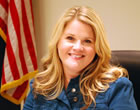Blaine Homeowners Reject Nation’s “First Certified Green Neighborhood”
 Solar power farms generally get built in rural areas, due to aesthetic and property value considerations. So Blaine residents were caught off guard last fall when Connexus Energy and city planners hyped a huge solar installation proposed next to their suburban subdivision as “the country’s first certified green neighborhood.”
Solar power farms generally get built in rural areas, due to aesthetic and property value considerations. So Blaine residents were caught off guard last fall when Connexus Energy and city planners hyped a huge solar installation proposed next to their suburban subdivision as “the country’s first certified green neighborhood.”
“If the project proceeds, the entire Sanctuary neighborhood will be powered by clean, renewable solar energy. That will be a first!” Connexus Energy Vice President Brian Burandt said in a November 30 letter to residents. “How will this benefit you? Your home will be served by 100 percent green energy for 25 years.”
From the start City Hall threw its clout behind the proposed field of solar panels with a capacity to power about 760 homes, giving the project an aura of inevitability.
“It’s an alternative energy and limits the use of coal, which everyone wants,” Blaine Mayor Tom Ryan said at a December public meeting. “It limits the carbon footprint.”
But what started as a feel-good project for the environment went awry when residents got wind of the project’s size and scope—nearly 14,000 solar panels to be installed in a nearby 23-acre field just out their windows.

Homeowners determined there’d never been a big solar farm placed so close to a residential neighborhood anywhere in the country. When residents spot checked zoning regulations in other jurisdictions, they learned that none of the nine cities and three counties allowed big solar farms near residential neighborhoods like theirs.
Yet residents got the feeling city officials were more interested in rubber-stamping the project than in listening to their concerns over safety, aesthetics and property values.
“Cities should put their citizens first because that’s who they are there to serve,” said Chris Hildrum, a Blaine resident who led the opposition. “They should not put energy companies, government entities or anything above the people they are there to serve. And when they do that, they create problems for everybody and everything.”
At the same time a well-connected environmental advocacy group named Fresh Energy joined the discussion to sell neighbors on green energy’s environmental and financial benefits. In a letter sent to residents the St. Paul-based environmentalists went so far as to claim the project could increase their property values.
“A certification proving your ownership of the solar energy credits will be provided to you for the entire life of the project,” states the letter from Fresh Energy Executive Director Michael Noble and Director of the Center for Pollinators in Energy, Rob Davis. “Recent studies are increasingly demonstrating the new reality of our modern lives—homes with green energy features are in demand and, with the right real estate agent, are able to command a price premium over other homes.”

Days before city officials were set to amend the city code to allow solar farms in Blaine in late December, residents finally got through to City Councilor Julie Jeppson.
“I’m guessing this is not the last time we’re going to hear about it. So let’s prepare ourselves so when the right opportunities come up so we’re ready for them,” said Jeppson, a supporter of prudent solar development. “So we don’t have these huge miscommunications with neighbors and make them feel like we’re sneaking something under the radar with them. Have it out there, this is our policy, this is how we’re going to uphold it.”
Connexus Energy officially withdrew its proposal in a January 5 letter that confirmed residents’ concerns over the vetting process.
“To achieve our goal, time is of the essence,” Connexus Vice President Brian Burandt said in the letter. “The site and design issues raised by the City, as well as the neighborhood, will require more due diligence and time in order to properly move forward and likely cause us to miss the 2018 opportunity.”
Connexus did not rule out solar development in Blaine in the future. In the meantime, the Blaine City Council continues to weigh possible changes to the city code to allow safe solar development in the Twin Cities suburb.